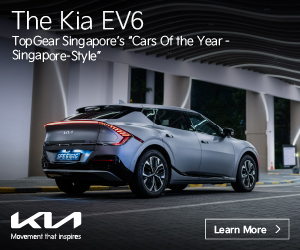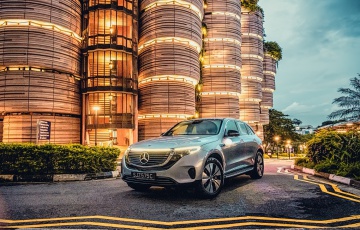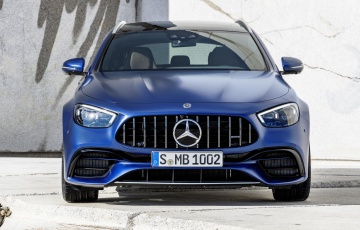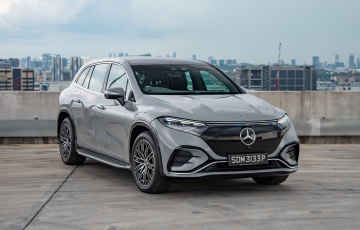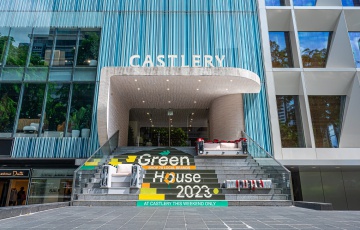A chat with Merc CEO Dr Dieter Zetsche

During the launch of the new Mercedes B-Class near Vienna on Monday, Mercedes' CEO Dr Dieter Zetsche arrived looking tanned and calm, rolled up his shirt sleeves, and offered to take Top Gear for a drive.
We thought, why the hell not? From the next-gen Mercedes range to the Eurozone crisis, from fuel cells to Formula One, here's what Dr Z had to say...
So exactly how hands-on are you Dr Zetsche?
"I'm in our design studio at least twice a month, maybe more. This is where all our projects are reviewed, from first drawings to the design freeze. We meet to revise or discuss technical aspects, the product in general, whether it's the specification, the CO2 targets, technology... I attend frequent test drives. There is one next week, for the new A-Class, and we are at the final stage with the new SL. I regularly request prototypes for the weekend or for an evening. So I would regard myself as pretty hands-on. We discuss every grab-handle, every gap, in detail, it's absolutely necessary..."
The B-class introduces the new 'compact' platform, which underpins not just the new A-Class but also an upcoming small SUV, a small coupe and another car you have yet to announce. What were your priorities?
"Fuel efficiency is inevitably the top priority. Obviously we have demanding targets to achieve, on the one hand with power-train technology, but also with aerodynamics. It's not generally discussed, but we are champions in aerodynamics: the B-Class's drag co-efficient is 0.24 in its Eco version, which is a championship figure by some margin.
"Secondly, Collision Prevention Assist is a first in this segment [a radar-based system which works with Brake Assist to prevent accidents], which is important because it's a costly innovation. We tend to compare it to the ESP in the first A-Class, and it didn't take a moose to get us there this time. These two elements are consistent with our ultimate aim to deliver emission-free driving with accident-free driving. But this is also a platform we're confident we can leverage for even better dynamics."
All-electric power is gaining more widespread acceptance. Are you adhering to your 'mixed economy' of future power-trains?
"We don't think there will be a future with one drive-train. We clearly see potential for petrol-electric vehicles, mainly in urban areas, because of range constraints, and mainly in smaller vehicles. So Smart is the key vehicle there, though the B-Class has potential too. Hybrids are good for larger vehicles, including plug-in applications, which we are pursuing. But for an emission-free vision which doesn't stop with a Smart or an A-Class, you need a fuel cell, and we think we are pretty much ahead of the competition in that area. But this doesn't help because we need alliances and we need infrastructure."
You must spend as much time lobbying ministers as you do running the company...
"Not quite as much! Last week I met the R&D minister in China, and he's convinced about the future I outlined but thinks there's about another five years to go. I told him, 'we are ready, let's go for it now.' We think that product-wise, from a performance point of view, it's mature for the customer. But it will only work if the infrastructure is being developed in parallel."
As one of Germany's top business figures, how do you feel about the crisis that's currently gripping the Eurozone, and Germany's central role in it?
"People who are involved in business, in Germany, are totally convinced that this is the only platform, the only choice which exists, there is no way back out of Europe... I mean, who in a world of seven billion cares about the views of 80 million Germans? Nobody. [pause] Legally there is no exit clause, so you can't send somebody out of the Euro. Despite the current trouble, I think Germany has probably benefited the most from the introduction of the Euro, and still does. We would suffer the most if it were to go away. It's worth a lot to re-stabilise the system, though not at any price.
"That, of course, is not necessarily the opinion of 80 million Germans. There is a popular view that queries 'why you would spend all this money on the lazy Greeks' and so on, and that is something you have to take into account. As to which is the best technique to reduce anxiety in the financial markets, and to re-state some confidence in the euro? That is a different question. Perhaps we have seen too little action too late.
"On the other hand, the politicians aren't all financial experts, and they see the resistance of the population; that is part of the democratic process, it works slowly, if you can afford for that to continue under the current pressure. These are realities and you have to accept them to a certain extent."
Are you worried about the Chinese economy over-heating? It seems that many of the big European car makers have become dangerously reliant on China...
"I see it exactly the opposite way. We used to be dependent on Europe and North America. Now we have almost four pillars: China, and you could build a cluster out of the other emerging territories - Turkey, South Korea, Latin America. This is a much better distribution of risk."
Let's discuss Formula One. Mercedes has just hired [former Ferrari technical director] Aldo Costa and [former Williams aerodynamicist] Geoff Willis.
"Ross and I discussed it and agreed that we needed some reinforcements. He made the appointments."
What are your current feelings about Mercedes' F1 campaign as the 2011 season enters its final stages?
"Altogether, it's not living up to our expectations. In our first year, I think people thought it would be a winning package from the get-go. It wasn't, but as a storyline it was better because otherwise everybody would have thought, 'this is easy!'
"Certainly, in the second year we wanted to improve and we haven't. One aspect is that Ross Brawn thought he could do it all on his own, and though he's probably the best brain in the business he still needs some help. Which is what we're setting up now."
Are there issues with the team being based in Brackley, in England?
"What's important is that the team and engine-builder are close together. The distance to Stuttgart should be about the length it is. If you try to pour know-how into an F1 team then over time it becomes similar to your own organisation, and that's not good for a race team. You don't want too much bureaucracy. You don't need it in a big company either [laughs], but to some extent it's inevitable. So, that one's fine, I don't see a problem there. It took us some time to build up trust, to work together to see where the deficits were. I was optimistic for last season. And I'm still optimistic for next season, that we will become more competitive. But this year, yes, it's certainly been rather disappointing."
And Michael Schumacher?
"You tend to look very smart and talented when you have a good car, and the opposite when you don't. You are forced to go to the absolute limit which can lead you to making mistakes. Then there is the comparison between team-mates, and for most of the time Nico has looked significantly superior.
"Obviously, F1 is constantly changing. When you are not part of it for some time, it will take time to re-adjust and that might take a little longer when you are 40 than when you are 20. But in the last three or four races Michael seems to be performing a lot better. He was always ambitious but in the races he didn't look comfortable. In the last three or four races it has looked different. We might have the turnaround in this regard."
Are you satisfied with how F1 is currently set up?
"I prefer to see the highest level of unanimity, at least between the big teams. We're getting that, there are good personal relations with the other guys. I want transparent rules and a transparent application of the rules. Part of the media excitement is when that doesn't happen, but there's too much money involved for that to go on. I want the customer watching the race, watching on TV, to become the focus. I see some deficits in that regard. I think more could be offered than there is today.
"Last but not least, I want to improve the ratio between the resource allocated and the bang for your buck. There are efforts under way to improve that. We need to reduce costs, and see that our participation in the pie is increased."
Are you happy with F1's current governance?
"[pause] It has been worse... If I were to design it on a clean sheet of paper, I would have some further ideas... we'll see."
Finally, have you driven the new McLaren road car?
"I haven't driven it but I have heard it's a pretty good... Ultimately, it was the main reason we separated from McLaren. The shareholders were not aligned; we didn't have any need for another brand for sports cars. I certainly wish them luck but it's not something I wanted to invest money in. As an investor in this business, my main concern wouldn't be a lack of character it would be a lack of brand. McLaren has a great history in racing, but as an automotive brand if it has to compete with Ferrari or Mercedes it's a tough call."
